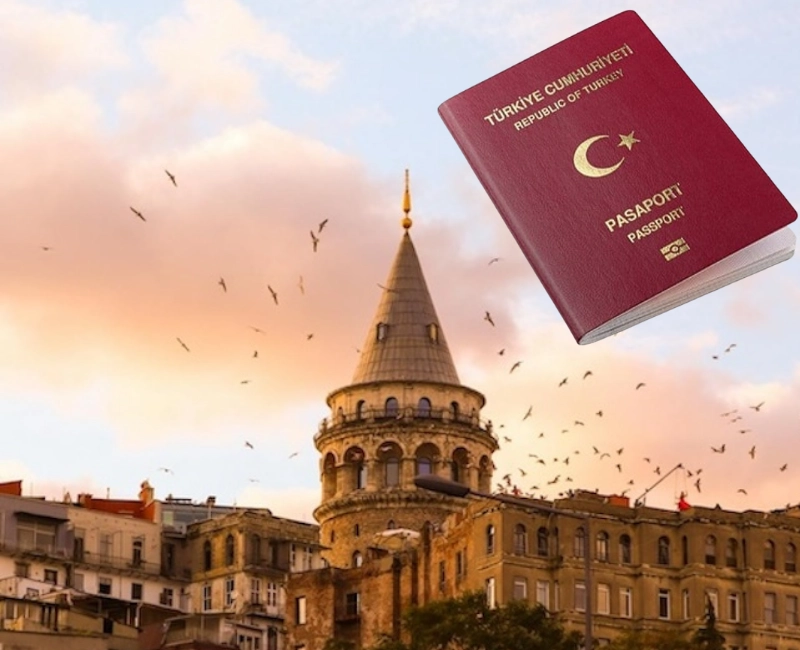Turkey offers several paths to acquire citizenship, and over the years, these paths have undergone several regulatory revisions. While in the past citizenship was primarily granted through marriage or employment, investment citizenship has been the most popular and quickest path in recent times. especially with Turkey introducing fast-track arrangements, the program has been luring foreign investors withits offer of global mobility, lifestyle benefits, and access to a dynamic market.
But with all its advantages, this process has also sparked debates and raised important economic and social questions. In this article, we’ll take a detailed look at the methods for acquiring Turkish citizenship and examine the broader impact of the Citizenship by Investment (CBI) program on Turkey’s real estate sector and economy.
1. Legal Pathways to Acquire Turkish Citizenship
Citizenship Through Marriage
Foreigners who marry a Turkish citizen and have been married for at least three years can be granted Turkish citizenship. This path requires some integration because the state examines the sincerity of the relationship, the extent to which the applicant has been integrated into Turkish society, and the contribution to family life.
Citizenship Through Employment
Foreigners who reside and are employed in Turkey with a valid residence and work permit for a certain period of time may qualify for citizenship. The process considers the economic contribution of the applicant and social integration, with background screening to obtainadherence to national standards.
Citizenship Through Investment
The most sought-after route these days is through real estate or capital investment. The program, which was initiated by presidential decree in September 2018, initially allowed foreign investors to attain Turkish citizenship by investing in real estate valued at a minimum of $250,000 USD. However, on June 13, 2022, the minimum investment amount was raised to $400,000 USD.
2. Why the Investment Route is So Popular
Turkey's Citizenship by Investment program is popular because it is fast, accessible, and flexible.
Citizenship is achievable without the applicant having to visit Turkey at all by issuing a power of attorney to a legal representative. There is no need for Turkish language and all this can be accomplished remotely—extremely convenient for busy investors.
The most important eligibility condition is the minimum investment in property valued at $400,000 USD, backed by a real estate valuation report approved by the government. These streamlined processes have made Turkish citizenship highly appealing to families, businesspeople, and high-net-worth individuals looking for international expansion.
3. Controversies and Challenges Behind the Boom
As much as the program has driven growth and demand, it has notbeen without challenges.
In the early days of the $250,000 program, mistakes in application processing were common. In some cases, applicants from countries that recognize religious or polygamous marriages were allowed to apply for citizenship for multiple spouses and large groups of children—raising eyebrows and bringing regulatory scrutiny.
Also, the accelerated approval of foreign residents and citizenship has provoked debates on national security and the makeup of society. The rising number of foreign investors in key urban areas has altered the face of local communities, triggering terror among citizens. This hasprompted the government to tighten documentation and enhancesecurity screening.
The real estate sector has also felt the ripple effects. Increased demand led to high price increases in the major cities, especially Istanbul, Antalya, and İzmir. While the boom benefited developers and sellers, it made the property less affordable for most of the locals.
4. Delays in the Fast-Track Process and Investor Frustration
Ironically, the "fast-track" citizenship procedure is no longer living up to its title. In recent months, growing numbers of investors have beenreporting significant delays, with applications now taking upwards of two years—despite earlier promises of 6–12 month turnarounds.
For investors who had organized business plans, family relocation, or long-term residency around the process, these delays have created uncertainty and frustration. Some have postponed purchasing property, while others are calling into question Turkey as an investment destination altogether.
This bottleneck is already affecting the broader market. Experts havecalculated that ongoing delays can cause a 15% contraction in Turkey's real estate investment market, with reduced foreign capital inflow and decreased sales volumes.
5. The Economic Impact of Slowed Citizenship Processing
The application backlog has had practical effects on Turkey's economy. The once surging foreign demand for real estate—driven by the promise of citizenship—has slowed considerably. Property prices are stabilizing or falling as a consequence, and developers are getting fewercustomers for high-end projects.
This deceleration has implications beyond real estate. Slowerconstruction means fewer jobs, less capital mobility, and reducedeconomic growth. For a country that has relied so heavily on real estate development and foreign investment as engines of its economy, this isa serious test.
The conditions have also damaged Turkey's reputation for international investment. Uncertainty in timelines and regulatory changes have led to some investors withholding investment, particularly in sectors where other citizenship programs—such as those in the UAE or Caribbean—are more predictable.
Conclusion: A Program in Need of Revitalization
Turkey's Citizenship by Investment program remains one of the most appealing in the world—but it is clear that efficiency, transparency, and investor confidence must be restored. Addressing application delays, offering equitable and consistent screening, and better informingapplicants will go a long way to maintaining Turkey's position at the top of the list of destinations for global investors.
For foreign investors, understanding the full scope of the program is essential. It’s no longer just about buying property—it’s about timing, strategy, and having the right guidance.
At Gain Estates, we help investors navigate the entire citizenship journey from start to finish. With over a decade of experience, legal partners, and insider knowledge of the Turkish property market, we ensure your investment is not just safe—but strategic.
Interested in getting Turkish citizenship through investment?
Let's talk and work out an individual plan to fit your goals.
Turkey: The Only Country Where Real Estate Can Lead to Direct Citizenship — And You Can Get Your Money Back
Discover why Turkey’s real estate citizenship program is one of the world’s strongest. Get citizenship, pr...






